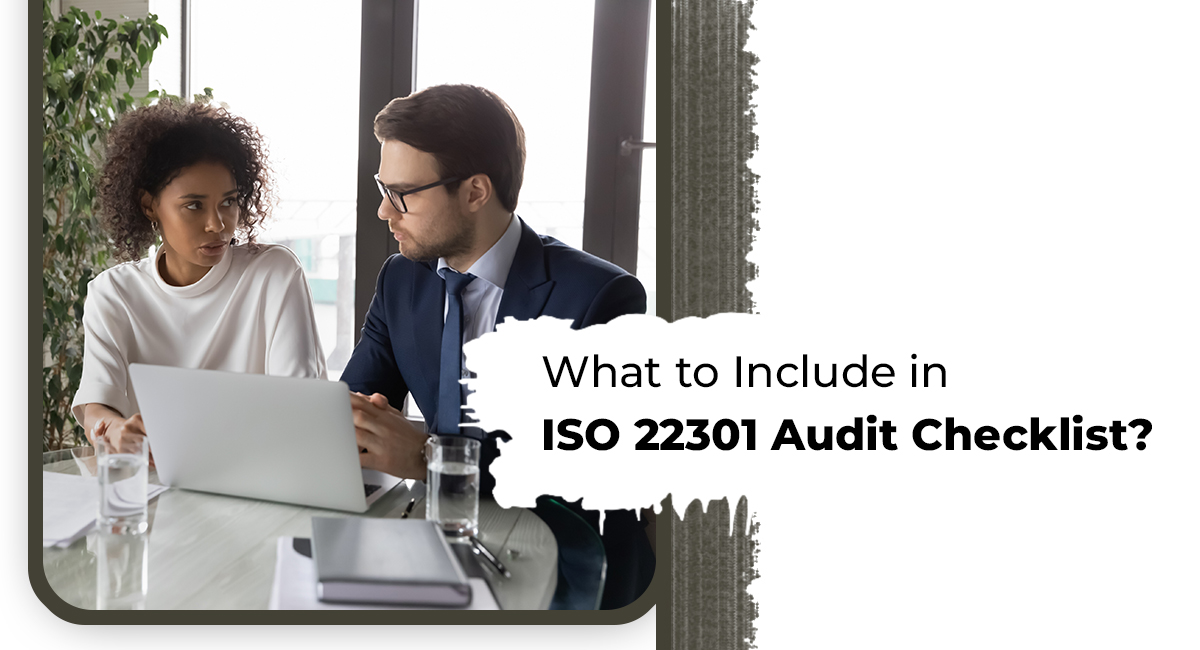The business continuity management system provides the most effective asset protection plan. ISO 22301 is designed to provide a concrete protocol that helps a company prevent and recover from potential hazards. Since a disaster can arrive anytime, all types of resources should be given the ultimate security so that they can perform as per their ability even after going through the disruptions.
The ISO 22301 certification procedure needs to be streamlined and the trickiest part is the internal audit. ISO 22301 audit is the second most significant evaluation after a gap analysis. It helps to check the progress and compare the financial outcome of the implemented system.
The process can take more than the usual time if the checklist is not ready properly. The audit checklist plays a crucial role in determining the final outcome of the assessment. Therefore, the content of the checklist should be designed carefully. Companies often make grave mistakes while choosing the right questionnaire for the checklist. Lack of experience and proper knowledge can turn the entire process exhausting and unprofitable.
The following post has briefly discussed what should be in the audit checklist for ISO 22301.
What is a checklist for an audit?
The audit checklist is considered a tool to facilitate the entire process. An audit checklist primarily adds information on the following –
• Scope of the audit
• Evidence collection
• Tests
• Each method for the test
• Analysis of the test results
The main areas of an audit checklist are – the standard, the procedure, performance monitoring, reporting, and system development. The checklist often includes follow-up actions for further modifications and improvements.
What are the main benefits of keeping an audit checklist ready?
• The audit checklist is an excellent mechanism for planning and maintaining time
• It acts as a database for contingency audit planning
• It ensures a flawless and productive process
• A checklist helps ensures that all the necessary evidence has been collected
• It ensures that the proper audit scope has been followed
What are the testing methods of the ISO 22301 audit?
Before understanding what should be incorporated into the audit checklist, it is necessary to understand the five fundamental methods for testing. There are five processes for audit testing. They are as follows –
• Observation
• Re-performance
• Observation
• Inspect all the evidence
• CAAT (Computer-Assisted Audit Tecnique
The ISO 22301 Audit Checklist
The checklist should be designed as per the main clauses of the ISO standard.
Clause – Organizational context
Understanding the organizational context both internal and external is necessary when performing the audit. For an effective business continuity management plan, you need to define the organization first. A company is influenced by several factors, which must be enlisted while defining the context. The continuity plan should be made considering the values, interests, and opinions of each stakeholder. Accordingly, the following three things should be on the checklist
• All the internal and external problems, which influence the need for a robust continuity plan should be listed.
• The individual requirements of each stakeholder department should be listed.
• All the relevant laws should be enlisted
Clause – Limitation of the BCMS
As per clause 4, the business continuity management system should have a clearly defined boundary. Accordingly, the checklist should have the following –
• All those aspects, which are related to the scope
• Outputs, which are incorporated in the scope
• Explanation of the exclusions in a document
Clause – Management proactiveness/leadership
To effectively utilize all the necessary resources, a company needs proactive management. A strong sense of leadership and an understanding of the fundamentals are required. The management should be fully committed to the plan. To check that, the list should have –
• A clearly states business continuity plan and policy
• If the policy has been communicated to the internal and external stakeholders
• Leadership responsibilities
Clause – Objectives & Resources
• Risks and opportunities
• Plan to work on the risk factors
• Objectives
• Determining the ideal resources
• Confirmation of resource acquisition
• A communication plan
Clause – Business Impact Analysis
• Key factors that influence product and service
• Identifying the resources to deliver the service
• Identifying and determining the business impact
• Setting a time frame for the recovery
Clause – Risk Assessment
• Risk identification
• Risk aggregation
• Prevention strategies
Clause – Procedures and plan
• Procedures for risk detection, aggregation and aversion
• Plan for acquiring resources and investing them for the ultimate execution
Clause – Continual Improvement
• Risk Control
• Plans for removing gaps
• Determining areas of improvement
• The corrective measures
To design an effective ISO 22301 audit checklist, you can hire expert consultants from Blue Wolf Certifications. It is India’s premium ISO consultancy website providing solutions for conducting internal audits before system registration.




